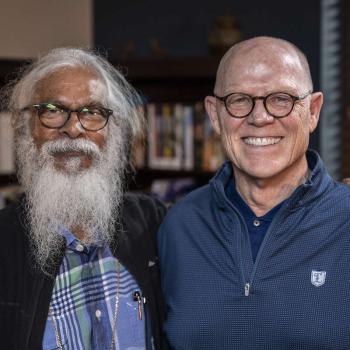By Daniel L. Hardt
 I love the topic of money. No, I didn't say I love money; that would be a problem. But, as a Christian living in a society of abundant goods and services, I am intrigued by the topic of money and what people's spending patterns can reveal about them. In my twenty-five years as a financial planner I've learned the correlation between our money and our spiritual well being. When we make decisions about money, we can 1) find new and fresh ways to discover God's calling in our life; 2) see our faith-life intersect with our physical life in very practical ways; and 3) test ourselves to see if our actions line up with what we claim to believe.
I love the topic of money. No, I didn't say I love money; that would be a problem. But, as a Christian living in a society of abundant goods and services, I am intrigued by the topic of money and what people's spending patterns can reveal about them. In my twenty-five years as a financial planner I've learned the correlation between our money and our spiritual well being. When we make decisions about money, we can 1) find new and fresh ways to discover God's calling in our life; 2) see our faith-life intersect with our physical life in very practical ways; and 3) test ourselves to see if our actions line up with what we claim to believe.
Financial counselor Larry Burkett was fond of saying, "The way Christians use money is the clearest outside indicator of an inner spiritual condition."
I can attest to this from firsthand experience. As I've observed the relationship Christians have with money, I've witnessed some inspiring actions. I'll never forget meeting the 39-year-old woman who was recently widowed. Though the majority of the household income disappeared at the husband's death, she still answered God's call to give to her local church 10 percent of the life insurance proceeds that were designed to care for her and her two young children.
But I've seen the ugliness, too. So many of us are looking for contentment through a nice lifestyle, often including amounts of debt equal to three or four years' worth of our annual incomes. I've also seen Christian clients with six-figure incomes who don't think there is any way they can give even 3 or 4 percent of their net income to the church or other charitable causes. And studying how we react to a challenging stock market could keep a Christian psychologist busy for quite a while.
As our hungry hearts long to use the topic of money -- just like every topic in our lives -- as a vehicle to a deeper relationship with our Savior and a greater sense of responding to Christ's call, it is helpful to remember a few principles:
Ownership: God owns it all. All "our" money and possessions are in fact owned by Someone Else, our God.
Stewardship: Our role is as a manager of that portion of God's resources that come under our control. This is just as relevant for the money we spend at the grocery, and add to our retirement plans, as it is for giving to the church's collection on Sunday.
The Perspective: So, then, every financial decision becomes a spiritual decision, a part of our response to our Savior. This is a wonderful, but possibly overwhelming, realization.
Our Choice: With each of our financial decisions, we can ask ourselves, "Who will we serve?" We know it is not possible to serve both God and money. God gives us free will to make the choice. We get to choose.
Direction: Fortunately, there is a lot of help for the journey. God's Word speaks often about money, we can seek God's direction in prayer, and we can learn from seeking spiritually wise counsel.
Over the years, I've become strongly convinced of two things: Money and possessions are impossible measures to use to judge others (as though we should be trying in the first place). But I'm equally convinced that this is a useful topic to use as a personal spiritual assessment, to look into our own hearts. Our introspection may identify reasons to rejoice as we see the ways in which our decisions about money show we really are after God's heart. But it can also show us our sin and selfishness, sometimes in blunt and brutal ways.
If you're like me, you may realize that most of your financial decisions have been quietly guided by cultural norms rather than by a Godly perspective. Fortunately, we can lean on grace, then learn to subject our financial perspective to match God's, just one step at a time.
This type of self-assessment of our spiritual well being, using the topic of money, may prove to be uncomfortable. But if we're willing to act on the new ways we find to say "yes" to our Lord, we will find a new joy and a peace that transcends understanding. When you think about "what's in your wallet," you'll be surprised by the freedom that comes in trusting in God more than in the so-called security of investments or of new and bigger stuff.
As a financial planner I can't offer many guarantees to clients. Frankly, investment returns are subject to more uncertainty that any of us would care to imagine. But here's a guarantee that I can make: If we will begin the lifelong journey of looking at each financial decision as a unique opportunity to seek and follow our Savior, we will live a life like no one else, we will make some turns we never could have anticipated, and we will grow in our appreciation of the great adventure that we are traveling with the Lord.




